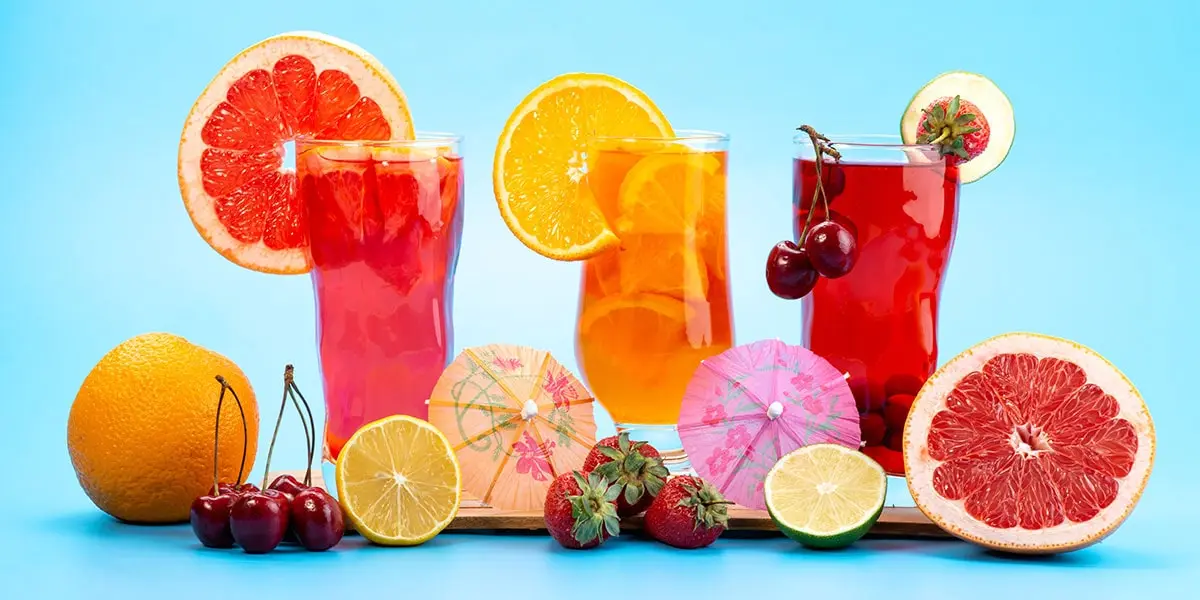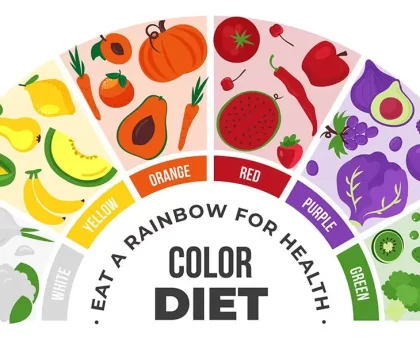Cold Drinks typically refer to carbonated or non-carbonated beverages that are served chilled or with ice. These cold drinks are popular for their refreshing and cooling properties, especially in hot weather or after physical activity.
The best cold drinks to quench your thirst can depend on personal preferences, but some popular choices that are widely considered refreshing and hydrating include:
- Water: Water is indeed the most effective and essential drink for quenching your thirst and staying hydrated. It is a natural and calorie-free option that helps maintain the body’s balance of fluids and supports various bodily functions. Drinking an adequate amount of water daily is crucial for overall health and well-being.
Here are some of the benefits of drinking water:
- Hydration: Water is the best way to stay hydrated, especially during hot weather or physical activities when the body loses fluids through sweating.
- Aids Digestion: Drinking water helps with the digestion of food and the absorption of nutrients in the body.
- Supports Organ Function: Water is necessary for the proper functioning of vital organs like the kidneys, which filter waste products from the blood.
- Temperature Regulation: Water helps regulate body temperature by sweating, which cools the body down.
- Promotes Skin Health: Proper hydration contributes to healthy skin by maintaining its elasticity and preventing dryness.
- Mental Clarity: Staying hydrated is essential for optimal brain function, concentration, and cognitive performance.
- Weight Management: Drinking water can help you feel fuller, leading to better appetite control and potentially aiding in weight management.
It’s important to drink water regularly throughout the day, even if you don’t feel thirsty. The general recommendation is to consume about 8 cups (64 ounces) of water daily, but individual needs may vary based on factors like activity level, climate, and overall health.
Remember to listen to your body’s signals and drink water when you feel thirsty. Keeping a water bottle with you throughout the day can serve as a reminder to stay hydrated and make it easy to access water wherever you go.
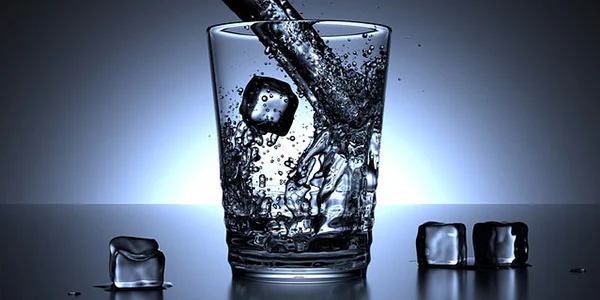
2. Coconut Water: Coconut water is a clear, refreshing liquid found inside young, green coconuts. It is a natural and popular drink known for its hydrating properties and various health benefits.
Here’s some information about coconut water:
- Hydration: Coconut water is an excellent source of hydration due to its high water content and natural electrolytes. It contains essential minerals like potassium, sodium, magnesium, and calcium, making it a great option for rehydrating after physical activity or in hot weather.
- Low in Calories: Compared to many other sweetened beverages, coconut water is relatively low in calories and naturally sweet, making it a healthier alternative to sugary drinks.
- Electrolyte Balance: Electrolytes are essential minerals that help maintain proper fluid balance in the body and support nerve and muscle function. Coconut water’s electrolyte content can help replenish these minerals, making it beneficial for individuals who sweat a lot or experience dehydration.
- Nutrient-Rich: Besides electrolytes, coconut water contains vitamins like vitamin C, B vitamins, and minerals such as manganese and copper, all of which play essential roles in various bodily functions.
- Natural Antioxidants: Coconut water contains antioxidants that help combat oxidative stress and may have potential health benefits.
- Digestive Aid: Some people find coconut water soothing for the digestive system, as it is light on the stomach and may help with mild digestive issues.
- Naturally Gluten-Free and Vegan: Coconut water is naturally free from gluten and animal products, making it suitable for those with gluten sensitivity or following a vegan lifestyle.
It’s worth noting that while coconut water is a healthy choice for most people, it does contain natural sugars, so moderation is still important, especially for those watching their sugar intake.
Coconut water is best consumed when fresh from young green coconuts. Be cautious when choosing packaged coconut water, as some brands may add sugars or flavors. Always check the label to ensure you’re getting 100% pure coconut water without any added ingredients.
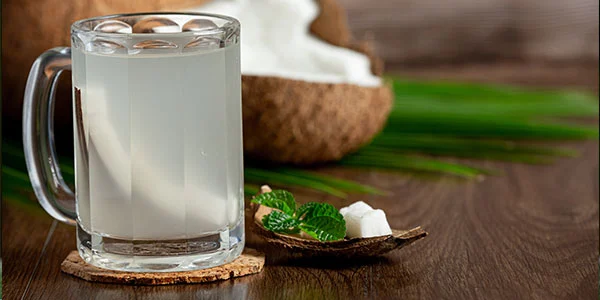
3. Lemonade: Lemonade is a classic and refreshing beverage made from freshly squeezed lemon juice, water, and sweetener, typically sugar or a sugar substitute. It is a popular drink enjoyed around the world, especially during hot weather, as it provides a tangy, sweet, and thirst-quenching taste.
Here’s some information about lemonade:
- Flavor: Lemonade’s primary flavor comes from the tartness of fresh lemon juice, balanced with the sweetness of the added sugar or sweetener. The ratio of lemon juice to water and sugar can be adjusted according to personal preferences.
- Hydration: Lemonade is a hydrating option, primarily because of its water content. However, it’s essential to balance the amount of sugar used, as excessive sugar intake may have negative health effects.
- Vitamin C: Lemonade is a good source of vitamin C, as lemons are rich in this essential nutrient, which supports the immune system and acts as an antioxidant.
- Customization: Lemonade can be easily customized to suit individual tastes. Some people enjoy adding a splash of other fruit juices, like raspberry or strawberry, for added flavor variety.
- Variations: There are various regional and cultural variations of lemonade. For example, some recipes include sparkling water for a fizzy version, while others may incorporate herbs like mint or basil for an extra twist.
- Homemade vs. Store-Bought: Homemade lemonade made with fresh lemons and natural sweeteners allows for better control over the ingredients and sweetness level. Store-bought lemonade, especially those sold in bottles or cans, might contain additional preservatives and higher levels of added sugars.
- Health Considerations: While lemonade made with moderate amounts of natural sweeteners can be a refreshing and enjoyable drink, it’s essential to be mindful of sugar content, particularly for individuals with diabetes or those trying to limit their sugar intake.
For a healthier alternative, consider using less sugar or opting for natural sweeteners like honey or maple syrup. Additionally, adding some water to the lemonade can dilute the sugar content without compromising the flavor significantly.
Overall, lemonade is a delicious and versatile drink that can be enjoyed on its own or paired with meals, making it a delightful beverage choice for various occasions.
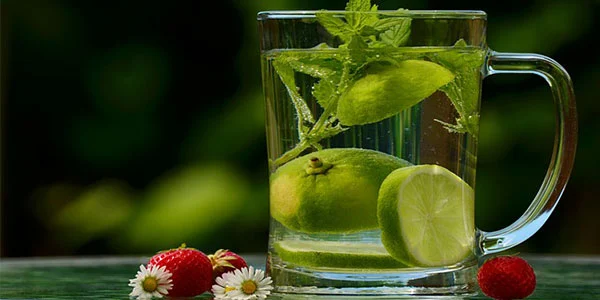
4. Iced Tea: Iced tea is a chilled version of traditional tea, which is brewed with hot water and then cooled down with ice. It is a popular and refreshing beverage, especially during hot weather or as a cooling drink after physical activities.
Here’s some information about iced tea:
- Types of Tea: Iced tea can be made from various types of tea, such as black tea, green tea, white tea, oolong tea, and herbal teas. Each type of tea offers unique flavors and potential health benefits.
- Flavors and Additions: Iced tea can be enjoyed as is, with a simple combination of tea and water, or it can be flavored with various additions. Common flavorings include lemon, lime, mint, peach, raspberry, and other fruits or herbs.
- Sweetened or Unsweetened: Iced tea can be served sweetened or unsweetened, depending on personal preference. Sweeteners like sugar, honey, or syrups are commonly used to add sweetness to the tea.
- Health Benefits: Tea is known for its potential health benefits, particularly when it comes to certain types of teas like green tea. Tea is a source of antioxidants, and some studies suggest that it may have positive effects on heart health, digestion, and cognitive function.
- Caffeine Content: The caffeine content in iced tea varies based on the type of tea used. Black tea generally contains more caffeine than green tea or herbal teas. For those looking to reduce caffeine intake, herbal or decaffeinated tea options are available.
- Versatility: Iced tea is highly versatile and can be easily customized to suit individual preferences. You can adjust the strength, sweetness, and flavors according to your liking.
- Commercial vs. Homemade: Iced tea is available in many stores and restaurants, both bottled and freshly brewed. However, making homemade iced tea allows you to control the ingredients and tailor it to your taste and health preferences.
To make iced tea at home, simply brew your favorite tea with hot water following the package instructions, let it cool, and then pour it over a glass filled with ice. Add sweeteners, lemon, or any desired flavors, and you have a refreshing iced tea ready to enjoy.
Overall, iced tea is a delightful and enjoyable beverage, offering a variety of flavors and potential health benefits, making it a popular choice for tea lovers and those seeking a refreshing drink to beat the heat.
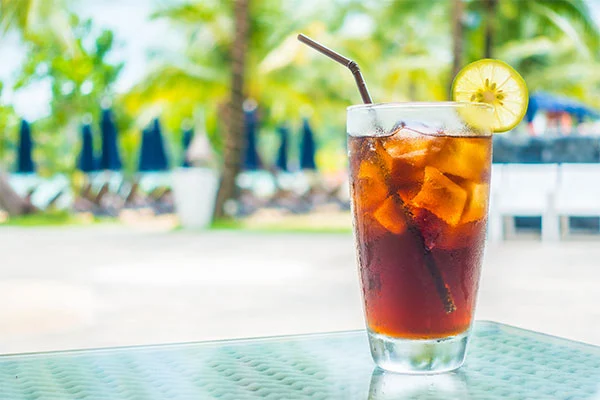
5. Cucumber Water: Cucumber water is a simple and refreshing infused water made by adding slices or pieces of cucumber to a container of water. It is a popular and healthy beverage choice, especially during hot weather, due to its mild and rejuvenating flavor.
Here’s some information about cucumber water:
- Hydration: Cucumber water is an excellent way to stay hydrated, as it adds a subtle taste to plain water, encouraging people to drink more fluids.
- Refreshing Taste: Cucumber water has a light and refreshing taste with a hint of cucumber flavor. It is often described as cooling and soothing.
- Low in Calories: Cucumber water is naturally low in calories, making it a healthier alternative to sugary drinks and sodas.
- Rich in Nutrients: Cucumbers are a good source of vitamins and minerals, including vitamin K, vitamin C, potassium, and magnesium. When you infuse water with cucumber slices, some of these nutrients leach into the water, providing a slight nutritional boost.
- Antioxidant Properties: Cucumbers contain antioxidants like beta-carotene, flavonoids, and tannins, which can help neutralize free radicals and reduce oxidative stress in the body.
- Digestive Benefits: Cucumbers are known for their mild diuretic properties and may help with bloating and water retention.
- Customization: While cucumber water is delightful on its own, you can also add other ingredients like mint leaves, lemon slices, or a dash of ginger for added flavor variety.
To make cucumber water, simply wash a cucumber thoroughly, slice it into thin rounds or chunks, and add the cucumber pieces to a pitcher or large jar of water. Let it sit in the refrigerator for a few hours to infuse the water with the cucumber’s flavor. The longer it sits, the more pronounced the cucumber taste will become. You can strain out the cucumber pieces before serving, or leave them in the water for added visual appeal.
Cucumber water is a healthy and hydrating option, especially for those who find plain water a bit bland. It’s a fantastic way to add a touch of flavor to your water without any added sugars or artificial ingredients. Enjoy cucumber water as a refreshing beverage anytime, whether at home, work, or during outdoor activities.
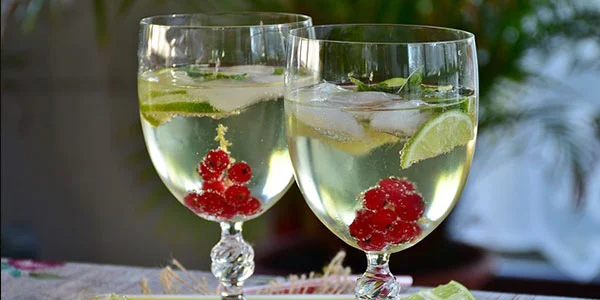
6. Watermelon Juice: Watermelon juice is a refreshing and naturally sweet beverage made from fresh watermelon. It is a popular choice, especially during the hot summer months, due to its hydrating properties and delightful taste.
Here’s some information about watermelon juice:
- Duration: Watermelon is composed mostly of water, which makes its juice an excellent choice for staying hydrated, especially in hot weather or after physical activities.
- Natural Sweetness: Watermelon juice is naturally sweet, thanks to the fructose content in the fruit. It provides a pleasant and satisfying flavor without the need for added sugars or sweeteners.
- Rich in Nutrients: Watermelon is a good source of vitamins A, C, and B-complex vitamins, as well as minerals like potassium and magnesium. These nutrients contribute to overall health and well-being.
- Antioxidant Properties: Watermelon contains antioxidants like lycopene, beta-carotene, and vitamin C, which help combat free radicals and reduce oxidative stress.
- Amino Acids: Watermelon also contains the amino acid citrulline, which plays a role in the body’s production of arginine, an essential amino acid that helps maintain blood flow and cardiovascular health.
- Easy to Make: Making watermelon juice is simple. Just remove the seeds (if any) and blend the watermelon chunks in a blender until smooth. You can strain the juice if you prefer a smoother texture, but many people enjoy the slight pulpiness.
- Versatility: Watermelon juice can be enjoyed on its own or combined with other fruits or herbs to create delicious and refreshing summer beverages.
It’s important to note that while watermelon juice is nutritious and hydrating, it does contain natural sugars, so it’s essential to consume it in moderation, especially for individuals with diabetes or those watching their sugar intake.
For an extra refreshing twist, you can serve watermelon juice chilled with ice cubes or combine it with other fruits like lime, mint, or berries to create different flavor profiles.
Watermelon juice is a fantastic option for staying cool and hydrated while also enjoying the natural sweetness and health benefits of this delicious fruit. Whether you make it at home or find it in stores, watermelon juice is a delightful and nourishing summer drink.
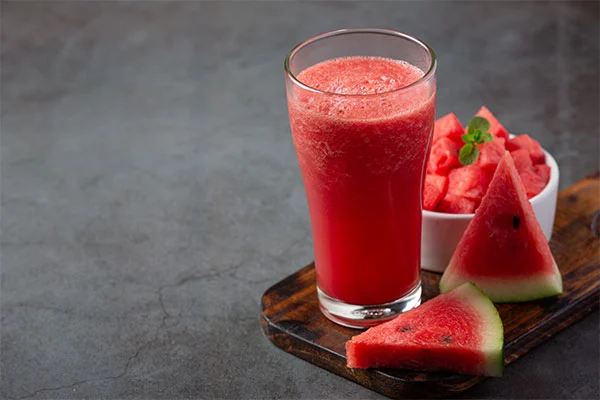
7. Sports Drinks: Sports drinks are beverages specifically formulated to rehydrate and replenish electrolytes, carbohydrates, and fluids lost during intense physical activity and exercise. They are designed to help athletes and individuals engaging in prolonged, vigorous workouts maintain proper hydration and performance.
Here’s some information about sports drinks:
- Electrolytes: Sports drinks typically contain essential electrolytes, such as sodium, potassium, calcium, and magnesium. These minerals are crucial for maintaining proper fluid balance, nerve function, muscle contractions, and overall hydration.
- Carbohydrates: Sports drinks often contain carbohydrates, usually in the form of sugars like glucose, sucrose, or fructose. Carbohydrates provide a quick source of energy during exercise, helping to sustain endurance and performance.
- Hydration: During intense physical activity, the body loses fluids through sweat, which can lead to dehydration if not replenished. Sports drinks help rehydrate the body by providing both water and electrolytes.
- Performance Enhancement: The combination of electrolytes and carbohydrates in sports drinks can help improve endurance and performance during prolonged exercise sessions or high-intensity workouts.
- Recovery: Consuming sports drinks after strenuous exercise can aid in post-workout recovery by replenishing glycogen stores and electrolytes that were depleted during the workout.
- Isotonic, Hypotonic, and Hypertonic: Sports drinks are classified based on their osmolality, which refers to the concentration of solutes compared to body fluids. Isotonic sports drinks have a similar osmolality to the body’s fluids and are quickly absorbed, making them ideal for rehydration during exercise. Hypotonic drinks have a lower concentration and are quickly absorbed, suitable for rapid rehydration. Hypertonic drinks have a higher concentration and are generally used for post-workout recovery to replenish glycogen stores.
- Sugar Content: Some sports drinks can be high in sugar, which is something to consider, especially if you’re trying to reduce your overall sugar intake. For less intense activities or shorter workouts, plain water may be sufficient for hydration.

It’s essential to use cold drinks appropriately and be mindful of their intended purpose. For most casual exercisers or individuals engaging in light to moderate physical activity, water is generally sufficient to stay hydrated. Sports drinks are best reserved for longer, intense workouts or activities lasting over an hour, where additional electrolyte and carbohydrate replenishment is beneficial.
As with any food or beverage, moderation is key. Always read the label to understand the ingredients and nutritional content of sports drinks, and consult with a healthcare professional or sports nutritionist if you have specific dietary or exercise-related concerns.
If you don’t like this article/post please share your feedback.

